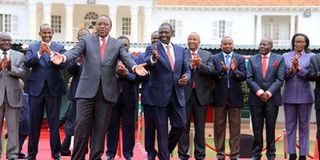Cord should refocus its efforts on crafting winning formula for next election

President Uhuru Kenyatta (front, left), Deputy President William Ruto (front, right) at State House in Nairobi on August 9, 2016 with officials of parties that will merge to form the Jubilee Party. PHOTO | JEFF ANGOTE | NATION MEDIA GROUP
What you need to know:
- Jubilee is not sealed, signed, and delivered.
- Many of the parties that have signed on will baulk at surrendering their individual identities.
- Many politicians will fear losing their party positions or their prospects for elective office.
- One suspects that even acolytes of President Uhuru Kenyatta and Deputy President Uhuru Ruto will retain the insurance of a briefcase party in case things unravel.
- Development of a viable democracy in Kenya is best served by strong national parties rather than the bewildering alphabet soup rump one-man ethnic outfits that presently litter the landscape.
- This should be the lesson for Cord.
There have been bumps and wobbles along the way, but the merger of the political parties affiliated to the Jubilee Coalition seems to be proceeding apace.
If all goes according to plan, President Uhuru Kenyatta’s TNA and Deputy President William Ruto’s URP will in the next three weeks or so officially seal their union, accompanied by bridesmaids Eugene Wamalwa, Kiraitu Murungi, Najib Balala, Noah Wekesa, Mwangi Kiunjuri, Kenneth Lusaka, and others who form the supporting cast in the grand merger.
Whatever one makes of the intended union, it demonstrates that President Kenyatta and Mr Ruto are very clearly focused on their game plan for the General Election next year, the 2022 presidential succession, and beyond.
Meanwhile, the only force with realistic prospects of checking the Jubilee juggernaut is floundering around like a headless chicken.
Not too long ago, the opposition Cord alliance of Mr Raila Odinga, Mr Kalonzo Musyoka, and Mr Moses Wetang’ula seemed as if it was into a winner with its Okoa Kenya initiative.
It was keeping the UhuRuto team on the defensive with a series of well-coordinated manoeuvres designed to exploit the all too apparent weaknesses of the Jubilee administration, ranging from a floundering economy, runaway corruption, broken election promises, skewed development, administrative excesses, and sabotage of the Constitution.
Demands for national dialogue evolved to the campaign for a referendum on constitutional amendments and then the agitation that forced moves to reform the electoral system.
But while Cord might claim credit for bringing to the limelight important issues for national debate, it seems to have forgotten that agitation by itself does not win elections.
While Jubilee is fine-tuning its electoral vehicle for 2017 and beyond, Cord is riven by internal rivalries, discord, and general disorganisation.
Jubilee has already determined that Mr Kenyatta will be its presidential candidate next year before handing over the baton Mr Ruto in 2022.
AUTHORITARIAN TENDENCIES
The method chosen to select the candidates may be dictatorial and a clear manifestation of the authoritarian tendencies that Jubilee inherited from Kanu.
No challenge will be tolerated when Mr Kenyatta and Mr Ruto are enthroned as the party's torchbearers by popular acclamation. If Jubilee followers accept undemocratic installation of their party leadership, this is their choice and their problem.
Instead of focusing their efforts on organising their coalition for a General Election due in less than a year, the Cord leaders are busying themselves with hitting out at Jubilee.
Mr Odinga and his discordant band should indeed be concerned that Jubilee is building a super party that could blow them out of the water. They should counter this by reorganising, rebuilding, and readying their own outfit for political battle.
Whining that Jubilee is becoming too big and powerful makes absolutely no sense. It should be the ambition of any party to grow big and powerful.
Mr Odinga’s ODM, Mr Kalonzo’s Wiper Party, and Mr Wetangula’s Ford Kenya should, therefore, subject themselves to serious soul-searching.
Do they want to offer a credible challenge to Jubilee’s bid for a second term in 2017? Do they want to present a strong united force or remain an uneasy grouping of competing fiefdoms?
If Cord still wants to present itself as a viable alternative, it could do no worse than to borrow a leaf from Jubilee. It could refocus its efforts on crafting a winning formula for the next election, starting by settling the thorny issue of the presidential ticket.
Recognition that a strong, united national party that cuts across ethnic and regional boundaries will always be superior to any collection of outfits competing with one another would also be a good start.
This is not to say that Jubilee is sealed, signed, and delivered. Many of the parties that have signed on will baulk at surrendering their individual identities. Many politicians will fear losing their party positions or their prospects for elective office. One suspects that even acolytes of Mr Kenyatta and Mr Ruto will retain the insurance of a briefcase party in case things unravel.
All the same, the development of a viable democracy in Kenya is best served by strong national parties rather than the bewildering alphabet soup rump one-man ethnic outfits that presently litter the landscape. This should be the lesson for Cord.
[email protected]; Twitter: @MachariaGaitho





